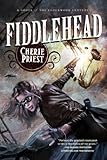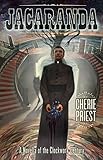CLASSIFICATION: The CLOCKWORK CENTURY series is set in an alternate history America, circa 1880, flavored with steampunk, western, intrigue, and horror.
FORMAT/INFO: Dreadnought is 400 pages long divided over twenty-two numbered chapters. Narration is in the third-person, exclusively via the nurse, Mercy Lynch. Dreadnought is self-contained, but loosely connected to Boneshaker and Clementine, the first two volumes in the Clockwork Century series. September 28, 2010 marks the North American Trade Paperback publication of Dreadnought via Tor. The beautiful cover art is provided by Jon Foster who also did the artwork for Boneshaker and Clementine.
ANALYSIS: How can a novel be both a pleasure to read and a disappointment at the same time? When that novel is Dreadnought, a satisfying reading experience when judged by its own merits, but disappointing when compared to its predecessors…
Dreadnought is the third volume in Cherie Priest’s Clockwork Century series after Boneshaker and the short novel Clementine. Like Boneshaker and Clementine, Dreadnought is self-contained, though loosely connected to the other volumes. In particular, Dreadnought stars Vinita “Mercy” Lynch, the daughter of Jeremiah Swakhammer who was introduced in Boneshaker, while other connections include sap and rotters. Dreadnought is also like Boneshaker and Clementine in that the book offers a different reading experience from the other volumes, which is where my opinion of the novel starts to diverge.
On the one hand, I applaud Cherie Priest’s decision to make each volume in the Clockwork Century series different from one another. After all, as much as I loved Boneshaker, the series would get stale quickly if every subsequent volume were just like the first one. So from this perspective, I’m able to appreciate some of the ways in which Dreadnought differs from the other Clockwork Century books. For instance, Dreadnought finally offers readers an intimate look at the Civil War that has been raging for nearly two decades in Cherie Priest’s Clockwork Century setting, a war that had been mostly relegated to the backdrop in Boneshaker and Clementine. As a result, Dreadnought possesses a darker, more serious atmosphere than its predecessors, one more appropriate to the book’s subject matter. Additionally, Dreadnought takes the time to develop thought-provoking themes that were only hinted at in Clementine including racism, loyalty, gender roles, and the rigors of war.
On the other hand, there were some differences I could have done without. For starters, Dreadnought is just not as entertaining as either Boneshaker or Clementine. That’s not to say that Dreadnought doesn’t have its moments. The scenes involving a crashed dirigible, giant mechanized walkers, raids against the Dreadnought-pulled train, and a climactic race against the Confederate engine, Shenandoah, are truly breathtaking for example. It’s just that these moments are few and far between, especially compared to how long it takes to get to the good parts, thanks to an inordinate amount of time spent on tedious matters like securing passage on various forms of transportation or becoming acquainted with fellow passengers. The author does incorporate some mystery and intrigue into Dreadnought in the form of missing Mexican soldiers, spies, sabotage, an inexplicable illness caused by sap addiction, and the Dreadnought’s mysterious cargo. Unfortunately, these subplots either take too long to develop with little payoff, or are too easy to figure out in advance, especially if you’ve already read Boneshaker. In short, I believe Dreadnought would have worked much better if it had been written as a novella. With a smaller word count, much of the unnecessary parts could have been cut out, resulting in a faster-paced and more engaging reading experience.
Another difference I did not appreciate was the author’s decision to write Dreadnought solely from the point of view of Mercy Lynch, whereas both Boneshaker and Clementine featured narratives that alternated between two different characters. I understand it would have been difficult to incorporate additional perspectives into Dreadnought considering the book’s plot, but I believe doing so would have kept things more interesting, while speeding up the pace.
On a related note, I also had issues with the characters in Dreadnought. One of the things I loved most about Boneshaker and Clementine were the memorable characters, both the leads and the supporting cast. In Dreadnought, Mercy Lynch may be a strong and resourceful protagonist, but she just doesn’t measure up to the much more interesting Briar Wilkes from Boneshaker or Clementine’s Belle Boyd. Part of the problem is a personality that lacks distinctiveness, although my main issue with Mercy Lynch is that she seemed to get caught up in events not because it was in her nature to do so, but because of her profession as a nurse. To make matters worse, the supporting cast — including the Ranger Horatio Korman, Miss Theodora Clay, Captain MacGruder, the scientist Malverne Purdue — also fail to impress, especially compared to the likes of Andan Cly, Lucy O’Gunning, Jeremiah Swakhammer, Algernon Rice, Phinton Kulp, etc. That all said, it’s hard not to appreciate Mercy Lynch as a character. After all, how many speculative fiction novels feature a nurse as the main protagonist? In particular, a nurse that eschews the stereotypes usually associated with the profession in favor of a more esteemed representation.
Despite the various issues I had with Dreadnought compared to its predecessors, I’m pleased to report that Cherie Priest’s performance is once again excellent, even if the dialogue falls short of the brilliance displayed in Clementine. In fact, Dreadnought may be some of the author’s best work yet, highlighted by such vivid prose as the following passage:
Moving up and down the aisles was like crashing through someone else’s nightmare, and it was an increasingly dark nightmare, with exponentially more terrors, as the light faded and the confusion mounted.
CONCLUSION: Judged by its own merits, Cherie Priest’s Dreadnought is a satisfying reading experience highlighted by skillful writing, a strong female protagonist, and heart-pounding action sequences. The problem I had with Dreadnought is when comparing the novel to the highly entertaining Boneshaker and the even more impressive Clementine. Compared to those books, Dreadnought, despite its many virtues, just doesn’t offer the same kind of fun, nonstop entertainment or unforgettable characters that can be found in the pages of Boneshaker and Clementine. Thus, my disappointment in the novel. That said, I’m still going to be one of the first people in line for Cherie Priest’s next Clockwork Century novel, Republic of Texas…
~Robert Thompson
 Dreadnought by Cherie Priest
Dreadnought by Cherie Priest
Dreadnought is Cherie Priest’s follow-up to Boneshaker. Sort of. While it takes place in the same alternate America at roughly the same time, and while we see a few familiar characters by the end of the story, Dreadnought is an otherwise indirect sequel. Instead, Priest introduces Mercy Swakhammer (yes, his daughter for Boneshaker readers), a nurse at a Confederate hospital during the decades-long Civil War.
Mercy’s adventure begins after she receives two important pieces of news. First, her Union husband has been killed. Second, her father is near death out in Seattle, and though he abandoned Mercy and her mother while she was still a child, he is desperate to see her once more. The first leaves her free to do what she wishes with her life and the second propels her on a risky cross-country journey from one coast to the other. The trip is rife with adventure, involving battles, airship crashes, raids on the trains, zombie attacks, mysterious cargo cars, missing Mexicans, a mysterious Texas ranger, and a possibly mad scientist. Will Mercy ever make it to the other side of the country?
I thoroughly enjoyed Boneshaker, but found Dreadnought to be a bit of a slog at times. I kept picking it up and putting it down, which is always a sign that I’m not particularly enjoying a book. I typically finish books in a sitting or two, and if it takes me more than three days to get through 400 pages, I’m just not that excited about it.
The pacing of Dreadnaught never quite falls into a smooth rhythm. The book starts off a bit slow, has some rollicking moments, then really slows down as we endure a lot of travel plans, an info dump, ticket buying, etc. For the record, I don’t need constant action, and I’m a fan of character-driven novels.
Unfortunately, the cast wasn’t that compelling, particularly the secondary characters. Whether it’s the Union commander, the fellow women passengers, the porters, or the mad scientist, they all felt a bit perfunctory. They play their role, but do little beyond it. I can’t say that I would have felt much had any of them not made it. Mercy, simply by being on stage all the time, is obviously more fleshed out, but even she lacks a consistently distinctive personality. Although she has a somewhat assertive personality, the plot often forces Mercy to be passive: ordered to do something rather than choosing it, reacting rather than choosing to act, etc.
What saves Dreadnought probably more than several strong scenes (and there are several such) is Priest’s sharp prose. For instance:
Sunset took forever; with no mountains or hills for it to fall behind… The warm light belied the chill outside, and the passenger cars were bathed in a rose colored glow even as the riders rubbed their hands together and breathed into their fingers, or gathered over the steam vents. Porters came through on the heels of the sun’s retreating rays, lighting the gas lamps that were placed on either side of each door, protected by reinforced glass so the light wouldn’t blow out with the opening and closing of these same portals.
This precisely detailed and wonderfully rhythmic prose runs throughout the book. I actually would have preferred more of it to balance out the less than magical dialogue/interior monologue.
I finished Dreadnought perhaps more satisfied at the finishing than the reading. It is a mostly well-written book that just didn’t fully capture my attention due to issues with pace and character. While I’d call Dreadnought a disappointment, it won’t prevent me from reading the next book in the series.
~Bill Capossere


 Dreadnought by Cherie Priest
Dreadnought by Cherie Priest









COMMENT Was I hinting that? I wasn't aware of it. But now that you mention it.... 🤔
So it sounds like you're hinting Fox may have had three or so different incomplete stories that he stitched together,…
It's hardly a private conversation, Becky. You're welcome to add your 2 cents anytime!
If the state of the arts puzzles you, and you wonder why so many novels are "retellings" and formulaic rework,…
I picked my copy up last week and I can't wait to finish my current book and get started! I…